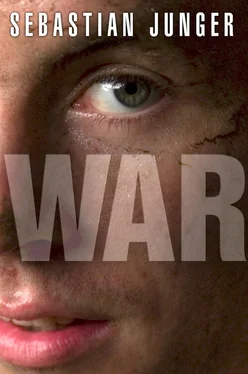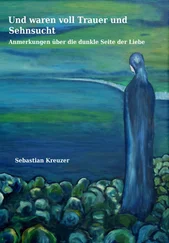“Proctor, why did you join the Army?” he said, pointing to one of the men.
“To fight for my country, sir.”
“Did you expect there was a chance you might get injured or that you might die?”
“Absolutely, sir.”
“Anybody join not knowing that might be an option?”
The men shook their heads.
“Okay, the country’s at war and you’re the ones stepping up and doing it,” Kearney went on. “It’s like one percent of the whole damn nation is out there doing it. What do you guys think would have happened if we had just stopped at Vimoto, didn’t go out there doing our aggressive patrolling, didn’t go out there and build OP Restrepo? You guys want to know what would happen? The same shit that happened today up at Chosen Company.”
The men are looking down and avoiding each other’s gazes. Many are smoking cigarettes and others look close to tears. Kearney repeats the information he has — nine dead, nine wounded — and then tells them that one of the dead is Abad.
“I guarantee you that if he hadn’t been doing his job when he died, there’d probably be more soldiers out there dead right now,” Kearney says. “So take honor in the fact that you guys trained up one hell of a fucking soldier.”
Kearney holds a moment of silence for the dead and then dismisses the men. “Carry me,” Jones says to Stichter quietly as he walks past.
BATTLE COMPANY’S LAST BIG MISSION GOES OFF AT dusk, lines of men moving down the slope to the landing zone and piling into Black Hawks. The 101st refused to fly into Grant and Cubs so the mission got scaled back to Third Platoon flying onto Divpat along with some Scouts and a unit of Pathfinders. The job of the Pathfinders is to clear the top of Divpat so that the next unit can land Chinooks up there. That way Viper Company could pick up where Battle Company left off. Battle will not be sweeping Yaka Chine; Battle will not go out of the valley with one last monster firefight. Most of the men seem relieved. A few are clearly disappointed. Someone who was probably going to get shot will now be going home alive and whole.
We’re there in minutes, the slopes of Divpat rising up fast and then suddenly becoming hard ground right beneath us. Men tumble out of the bird, hitting heavily with their full rucks and immediately going prone in the heavy brush, rifles aimed outward in case we take contact and uniforms rattling in the rotor wash. Then the bird rises up and pounds off to the west, dropping fast off the ridge and then carving back northward for the KOP. It’s almost dark by the time everyone is there, and the men wallow through the chest-high brush to set up fighting positions in the cardinal directions. I stay with Kearney, who finds a central place for himself near the 60 mm mortar. The enemy chatter starts almost immediately:
“It’s very important to talk to Mullah Nasrullah for permission to go to work tomorrow,” one commander says over the radio. “Let’s give them a good welcome on Divpat.”
Prophet is picking up information that the enemy has a Dishka and a mortar tube and that there are thirty fighters ready to assault up the slopes in the morning. Kearney kneels in the brush studying a laminated map and talking to Ostlund on the radio. His mission is to clear the landing zone for later use, but he and Ostlund have come up with a plan to lure the fighters onto the hill to kill them. The birds are going to come back for what’s known as a “false extraction” — they land and take off again, as if picking up men — but the Americans remain in place. When the fighters come up the slopes to check out what the Americans were up to they’ll walk straight into the Claymores and the guns.
The illume is a 100 percent and the fighters will be moving into position all night long. The radio chatter stops after a while and Prophet informs us that they’ve got their detection equipment on “scan” and will now be listening to the ball game. (The White Sox are playing the Cubs and there’s probably a certain amount of money at stake.) The moon comes up over the Abas Ghar and we lie in the brush listening to the wind sweeping over the top of Divpat. A surveillance drone buzzes protectively overhead. Everyone sleeps in their clothes and body armor and some men even keep their helmets on. If it starts it’ll start fast.
Dawn comes crawling up out of the east with the moon still hung over the valley like a dinner plate and the men wrapped in their ponchos and curled up shivering. More radio chatter but no contact and as soon as the sun has spilled over the top of the Abas Ghar the men disperse to their fighting positions. Kearney strings up camo netting over the brush to create some shade and we sit there waiting. The false extraction is blown already because the Pathfinders bound up their chainsaws cutting through the brush and had trouble rehanging the chains. The medic grew up on a farm and shows them how to cut brush without ruining the saws, and now in broad daylight they go to work finishing their job and blowing the biggest trees off the position with C-4. Over the battalion net it comes in that Destined is in contact to the east.
“Two ANA killed, we’ve only lost five so far,” Ostlund says over the radio. Five American dead would be a major event, but the Afghan soldiers are different, and undoubtedly they feel the same way about us.
Around midmorning Prophet suddenly picks up radio traffic from all over the southern part of the valley. “We are in position and ready to go to work,” one fighter says. Another answers, “I will go alone unless you are coming, in which case I’ll stay. I will tell you what I see.”
Prophet says the signal on the last one is very strong, which means the man is close. Kearney tells me he’s probably a spotter whose job will be to call corrections in to the mortarman and the Dishka gunner. Once those have us pinned down the other men will come up the hill to kill us. Kearney has a decision to make: he can take out the spotter with A-10 gun runs and ruin their plan, or he can let it unfold and hope to kill more of them when they come over the top. It doesn’t take him long to decide.
“Maybe it would have been better to let them mass for an attack, but this late in the game it’s just not worth it,” he tells me. The A-10s have finished their business and we’re sitting on the side of the hill looking eastward across the valley. It’s almost peaceful. “Mortars and a Dishka? I don’t need that shit and neither do the boys. For that matter,” he says, looking over at me, “neither do you.”
Three Months Later
Day after day of rain and early, sullen dusks. Second Platoon is about to disperse and will never exist again, as such, but the men are too busy — or messed up — to get overly sentimental about it. Bobby is running a fever of 103, coughing like a diesel engine and drinking all day long. Money marries a woman he met on leave a few months earlier. A soldier from Chosen Company gets taken to the hospital in an ambulance after collapsing in his room shrieking that people are trying to kill him. The toughest guys in the platoon find themselves crying every day, and the more vulnerable guys skirt the edge of sanity. “It’s even bothering me ,” Bobby confides to me over dinner. “And nothing bothers me. Can you imagine what it’s doing to some of the other guys?”
The petty tyrannies of garrison life have returned, and the men do not react well to getting reprimanded by other men who have never been to war. O’Byrne gets yelled at for not sitting in an armchair properly, meaning that he looks too comfortable. Solowski goes home on leave and finds out that his mother is days or weeks away from dying of liver disease. He uses up eight days of emergency leave and then has to go AWOL in order to stay by her side until the end. She is saved by an emergency transplant, thank God, but when Solowski returns to Vicenza, he gets busted down a rank and is made to work extra duty. Cunningham creeps out of bed at dawn and stands outside Battle Company barracks shouting “ ALLAHU AKHBAR! ” into a bullhorn. Men stagger out of bed thinking they’re still in the Korengal .
Читать дальше
Конец ознакомительного отрывка
Купить книгу












